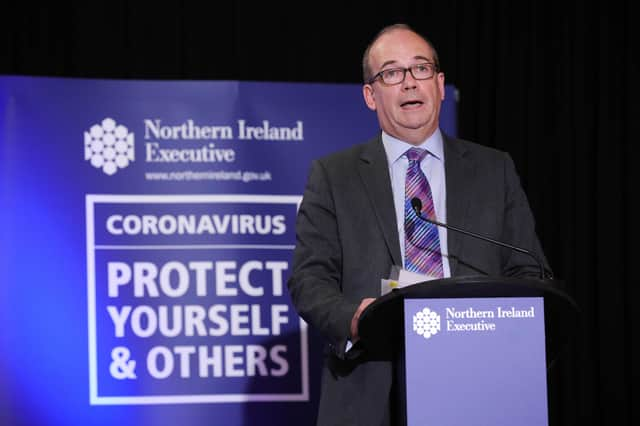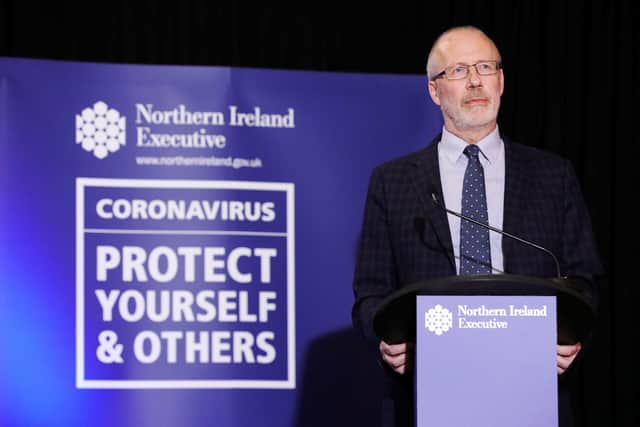Dr Michael McBride and Professor Ian Young: Don’t think Leicester lockdown couldn’t happen in Northern Ireland


We’ve heard it all before, haven’t we?
Wash our hands, keep our distance, follow the public health advice.
The same messages have been issued time and time again over recent months.


Here’s the thing. That advice has already saved many lives.
Advertisement
Hide AdAdvertisement
Hide AdAnd it is just as relevant today as when it was first issued – if not more so.
It was obviously easier to stay safe when staying at home was the order of the day.
Covid-19 had very limited opportunities to spread at that point. Adherence to social distancing was only relevant during very limited contacts with the outside world.
Now that people are out and about a lot more and socialising with friends, the virus has new opportunities to extend its reach.
Advertisement
Hide AdAdvertisement
Hide AdThat means vigilance is essential and complacency is a deadly enemy.
Don’t get tired of those messages just because they are so familiar.
We have seen examples – from Leicester to Melbourne – where the virus has flared up again, leading to constraints being re-imposed on daily life.
We must not think this could never happen here.
It very much could.
A return of lockdown measures is something we all should strive to avoid. WE CAN ALL PLAY OUR PART - THE VIRUS DOESN’T SPREAD ITSELF, WE SPREAD IT.
Advertisement
Hide AdAdvertisement
Hide AdThe restrictions of recent months have undoubtedly taken a heavy toll on the mental and physical well-being of many of our citizens. ALL OF US HAVE BEEN AFFECTED.
The economic impact will have public health consequences too – there is a well-established link between deprivation and poor health outcomes.
We must all play our part in keeping each other safe and protecting our recently restored freedoms.
With those freedoms have come much greater individual responsibility.
Advertisement
Hide AdAdvertisement
Hide AdPeople have to decide for themselves every day on how to mitigate the inevitable risks.
That will be the key case until we have a vaccine for the virus.
People across Northern Ireland responded admirably to the first surge of Covid-19.
We cannot praise them enough for the way they rose to this unprecedented challenge.
Advertisement
Hide AdAdvertisement
Hide AdThere are individuals walking around today who would not be with us were it not for this collective effort.
Right across the province, PEOPLE SHIELDED, people stayed at home, protected the health service and saved lives.
We have to sustain that spirit, that determination to keep looking after each other.
That means following those well-used messages – keeping our distance, washing our hands, covering our nose and mouth when we cough or sneeze, using a tissue and disposing of it – catch it, kill it, bin it.
Advertisement
Hide AdAdvertisement
Hide AdWe all need to avoid crowds, closed spaces and close contact with other people as much as we can.
It means wearing a face covering every time when appropriate – on public transport, in shops or other retail environments, or other indoor spaces where you can’t stay 2m from other people.
It also means co-operating fully with the Test, Trace and Protect Strategy that can help keep Covid-19 in retreat.
This is essential if we are to keep progressing out of lockdown.
Advertisement
Hide AdAdvertisement
Hide AdIf you have symptoms of Covid-19 - a new, continuous cough, a high temperature or a change in your sense of smell or taste – you must immediately report these symptoms and book a test.
You should also immediately self-isolate and co-operate fully with Contact Tracing Service in the Public Health Agency if you test positive.
More detailed information is available on the Agency’s website: https://www.publichealth.hscni.net/
Another holiday weekend is approaching and there is even a chance the weather might improve.
Advertisement
Hide AdAdvertisement
Hide AdBy all means enjoy yourselves, but please stay safe and stick with that familiar advice. WE REALLY DO ALL NEED TO DO IT TO GET THROUGH IT.
* Dr Michael McBride, Chief Medical Officer
* Professor Ian Young, Chief Scientific Officer